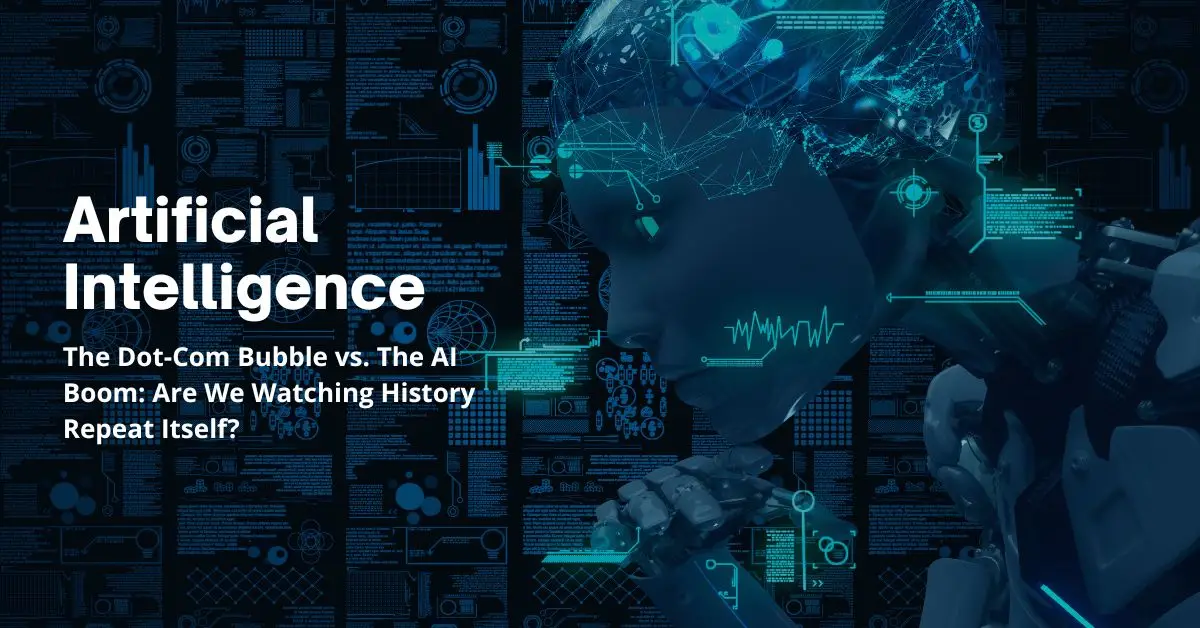The Dot-Com Bubble and the Rise of the AI Boom: History Repeating Itself?
In the late 1990s, the world witnessed one of the most dramatic financial phenomena in modern history — the Dot-Com Bubble. Fueled by the promise of the internet, investors poured billions into online startups, believing they had discovered a new economic frontier. Two decades later, a similar excitement surrounds Artificial Intelligence (AI). Once again, markets are booming, valuations are soaring, and questions are rising: Are we witnessing another bubble? Or is AI truly the foundation of the next industrial revolution?
The Dot-Com Bubble: Hype Meets Reality
The dot-com era began in the mid-1990s when the internet transitioned from a niche technology to a global force. The idea that every business could reach customers worldwide through a website was revolutionary. Startups with little more than a “.com” in their name raised millions in venture capital and went public at record valuations.
Investors and media alike celebrated these companies as the future of business. Stocks like Yahoo!, eToys, and Pets.com became overnight sensations. The NASDAQ Composite Index, dominated by technology firms, rose more than 400% between 1995 and 2000. For a brief period, it seemed that the internet could only lead to endless growth.
But behind the excitement, a hard truth lingered: most of these companies weren’t profitable. Many lacked a clear path to revenue, let alone sustainability. When confidence faltered in early 2000, the bubble burst. The NASDAQ lost nearly 80% of its value by 2002, and thousands of internet startups went bankrupt. Roughly $5 trillion in market value vanished.
However, from the wreckage came lasting innovation. Companies like Amazon, eBay, and later Google emerged stronger, proving that while the bubble burst, the underlying technology was real and transformative.
The AI Boom: Innovation Meets Hype
Fast forward to the 2020s, and Artificial Intelligence has become the new gold rush. From chatbots and self-driving cars to predictive analytics and creative tools, AI is reshaping industries. Companies integrating AI are attracting massive investment, and chipmakers like NVIDIA have seen valuations soar beyond imagination. Startups using “AI” in their branding can raise millions in seed funding, even before generating revenue.
The parallels to the dot-com bubble are clear. The language of “limitless potential” and “revolutionary disruption” sounds familiar. Investors, corporations, and governments are racing to secure a piece of the AI future — often without fully understanding how or when these technologies will pay off.
Yet, the AI boom differs in crucial ways. Unlike the early internet, AI is already creating measurable value. Businesses are automating tasks, improving decision-making, and developing entirely new products. The infrastructure — cloud computing, big data, and advanced processors — is mature and ready to scale. In other words, while hype is present, the foundation is far stronger than it was during the dot-com era.
Are We in an AI Bubble?
The answer is nuanced. There are bubble-like symptoms — soaring valuations, speculative investments, and exaggerated promises. Some AI startups will inevitably fail, just as many dot-coms did. But calling AI itself a bubble would be misleading. The technology is not a passing trend; it’s a paradigm shift. The overvaluation of some players doesn’t negate the genuine value being created across industries.
If history repeats itself, a correction may come — trimming the excess and leaving behind the innovators who can turn hype into sustainable growth. Just as the dot-com crash paved the way for the modern digital economy, an AI market correction could strengthen the field by weeding out weak business models.
Lessons from the Past
The key lesson from the dot-com era is not to fear technological revolutions but to approach them with realism. Excitement drives innovation, but success demands patience, solid strategy, and genuine value creation. The AI boom, like the internet revolution before it, will reshape how we work, live, and think. But only time will tell which companies — and which ideas — will stand the test of reality.

 The Republic News News for Everyone | News Aggregator
The Republic News News for Everyone | News Aggregator

